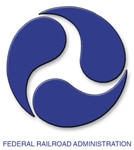 MONTGOMERY, W.Va.— The Federal Railroad Administration (FRA) today announced the cause of the February 16, 2015 CSX/Plains All American derailment in Mount Carbon, W.Va. The accident resulted in 27 derailed cars, a fire that ignited immediately and eventually burned for days and the evacuation of hundreds of local residents.
MONTGOMERY, W.Va.— The Federal Railroad Administration (FRA) today announced the cause of the February 16, 2015 CSX/Plains All American derailment in Mount Carbon, W.Va. The accident resulted in 27 derailed cars, a fire that ignited immediately and eventually burned for days and the evacuation of hundreds of local residents.
FRA was the lead agency tasked with responding to and investigating the February accident. Following a thorough investigation, the FRA announced the cause of the derailment to be a broken rail, resulting from a vertical split head rail defect. The defect that eventually resulted in the derailment was missed by CSX, and their contractor, Sperry Rail Service, on two separate inspections in the months leading up to the accident.
In addition to announcing the cause of the derailment, FRA also provided a path forward to prevent similar rail-caused accidents in the future:
- The agency announced it will release a Safety Advisory, which urges closer and more detailed inspections where defects and flaws are suspected, and stronger training for rail inspection vehicle operators
- FRA announced it will explore the need for rail-head wear standards and potentially require railroads to slow trains or replace a rail when certain conditions pose a safety risk
- FRA secured a commitment from CSX to require internal rail flaw operators to review previous inspection data alongside real-time data in order to assist in identifying conditions and flaws that have changed or worsened between inspections
“Our country relies on the safe transportation of large quantities of energy products across the nation, and it is our responsibility to require operators to implement strict safety standards,” said U.S. Transportation Secretary Anthony Foxx. “FRA’s findings and action today should make it clear to rail operators that we will do exactly that.”
The cause of the derailment – the vertical split head broken rail – was missed in at least two separate rail inspections in December 2014 and January 2015. Data from both inspections show evidence of the defect, but neither CSX or CSX’s contractor, Sperry Rail Service, discovered the defect which led to the broken rail. FRA has issued $25,000 fines against both CSX and Sperry Rail Service for failure to verify a potential rail defect.
The broken rail was also near the location of a previous broken rail discovered by an FRA inspector and repaired in May 2014.
“When we see a need for action, we will take it, and that is what FRA is doing today. Broken rail is one of the leading causes of accidents. Railroads moving crude and other hazardous materials through and alongside communities bear significant and special responsibility. All railroads, not just CSX, must be more diligent when inspecting for internal rail flaws or when contracting out inspection work,” said FRA Acting Administrator Sarah Feinberg. “This is just our latest effort to increase the safe transportation of crude and other energy products.”
Over the last two years, the U.S. Department of Transportation (DOT) has taken more than two dozen actions to improve the safety of the transport of crude and other flammable liquids. In May 2015, DOT released its final, comprehensive rule that raises the bar on the safe transportation of flammable liquids by rail. The rule requires stronger tank cars and a better, faster, more efficient braking system – electronically controlled pneumatic (ECP) brakes. ECP brakes can reduce the distance and time needed for a train to stop and keep more tank cars on the track in the event of a derailment. The DOT rule also supplements FRA’s actions to add an Automated Track Inspection Program car to inspect crude routes, focus track inspectors on crude routes via our CORETEX program, and secure voluntary agreements from railroads to inspect track more frequently than current regulations require.
Read the accident findings report: Accident Findings Report.
Related News
- New Jersey Train Length, Crew Size Law Awaits Governor’s Signature
- CSX Conductor, Single Mother Devastated in Head-on Collision
- Union Mourns the Loss of Brother Charles Harrison
- FRA Issues Grade-Crossing Safety Advisory
- Amtrak To Give SMART-TD Members Holiday Bonuses
- Value of Unions
- 2026 Railroad Retirement and Unemployment Insurance Tax Changes
- SMART-TD Members on UP Properties Ratify Five-Year Agreement
- Railroader’s Son to Perform at Carnegie Hall
- Rail Trespassing and Suicide Fatalities Up 70%